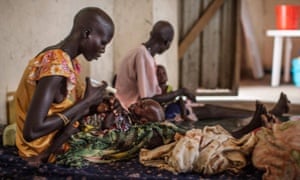South Sudan is on the verge of economic collapse, sparking renewed fears of famine as continued fighting takes a heavy toll on people’s livelihoods, a top UN official has warned.
Toby Lanzer, the UN humanitarian coordinator in South Sudan, said there is a “very high probability” that soaring inflation will cause the South Sudanese pound to collapse.
“It’s not only that South Sudan has some of the lowest human development indicators of anywhere. It’s not only that you’ve had 17 months of pretty brutal violence. It’s that we’re also in the midst of economic stress, which – to be clear – is on the verge of economic collapse,” said Lanzer.
“That will add significant pressure to people who are trying to eke out a living, and it will certainly send some people who have managed to get by over the edge, and turn them to just about surviving. People will be spending 80-85% of what income they have on food.”
South Sudan slid into civil war in December 2013, when president Salva Kiir accused his former deputy, Riek Machar, of launching a rebellion. Fighting has mostly been waged across ethnic lines, pitting Kiir’s Dinka against Machar’s Nuer.
About 3.5 million people – nearly 40% of South Sudan’s population – will require emergency food assistance by June, according to the famine early warning systems network (Fews Net).
In March, fresh skirmishes broke out, putting 650,000 people beyond the reach of aid agencies. Recent fighting has prompted NGOs to evacuate their staff from Leer, Koch, Nyal, Ganyiel and Mayendit, according to the UN Office for the Coordination of Humanitarian Affairs (Ocha).
The army said on Wednesday it had taken Leer, the town where Machar was born, from opposition forces after an almost month-long assault that has come at a huge cost to civilians. Paul Critchley, head of mission in South Sudan for Médecins Sans Frontières (MSF), told Agence France-Presse: “I managed to make contact yesterday with one of our South Sudanese employees in the Leer surroundings, who told me that he had been immersed in muddy water for up to nine hours to avoid bullets flying overhead. He recovered the bodies of two dead children from the swamp and reported that a woman from the group had been abducted. Someone else was looking after her baby.”
Rebels last week launched a major counterattack, including an assault on Malakal, the state capital of Upper Nile and the gateway to the country’s last remaining major oil fields. There has also been heavy fighting in vital oil zone areas north of Malakal, around the town of Melut, where two mortar bombs hit a UN base, killing four civilians including a woman and child.
Children as young as seven have been killed amid the rising violence; others have been raped, abducted, mutilated or recruited to fight. Survivors told the UN children’s agency, Unicef, that whole villages were burned to the ground by armed groups, while girls and women were raped and killed. At least 19 boys and seven girls were reportedly killed, said Unicef.
Critchley said: “The escalation has left people in conflict areas exposed to violence and without much needed medical care and humanitarian assistance.”
Much of the recent violence took place in Malakal, in the north-east of the country, where MSF has established a safe haven for about 30,000 civilians. “The highly volatile situation continues to prevent teams from being able to enter Malakal town itself,” MSF said.
Heavy rains are expected to spread across the country by the end of June, turning roads to mud and making it more difficult for aid agencies to provide assistance.
Fighting has also prevented farmers from planting new crops in time for the country’s rainy season, lowering expectations for future harvests. “[Recent violence] bodes very, very badly for the coming three to six months. I see the number of people who are severely food insecure growing sharply in the coming months,” said Lanzer.
Huge numbers of people already facing severe food insecurity will be unable to grow food, meaning the possibility of famine “cannot be excluded”, Lanzer said. “In a way, we are already very, very worried because the last place to have a famine was Somalia, but actually many hundreds of thousands of people died well before the famine was officially [declared],” he added.
There is mounting frustration, both within South Sudan and among the diplomatic community, over the slow progress of peace efforts. Talks brokered by the regional Intergovernmental Authority on Development floundered in early March.
“We don’t have any concrete news that [peace talks] are likely to begin in the foreseeable future,” Lanzer said. “There are so many of us here in Juba and on the ground in South Sudan who are really frustrated by the situation and the tragedy unfolding in front of our eyes. The greatest frustration is that we do not sense urgency and a will to foster reconciliation from the political leadership.”
On 16 June the European commission and Ocha will hold a conference in Geneva to raise money for humanitarian operations in South Sudan. Lanzer is hoping to raise at least $600m (£383m) for aid and logistics.
“That will be a very important moment for the aid operation in South Sudan. It will be crucial that we raise a significant amount of money in mid-June to help tide us over during this lean season, when we really need to step up the aid operation.”
But what the country really needs is a lasting peace deal, Lanzer said. “In the absence of peace, I find it difficult to see a way out of this.”
